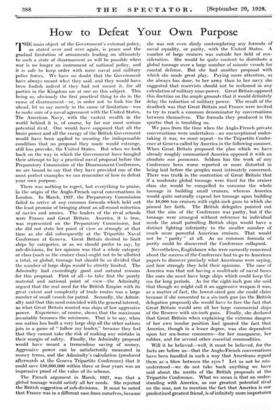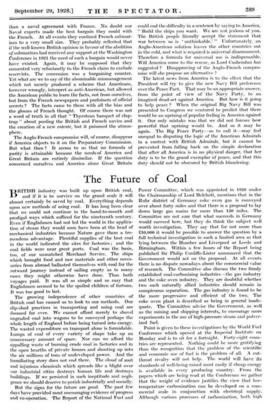How to Defeat Your Own Purpose T HE main object of
the Governments external policy, as stated over and over again, is peace and the gradual limitation of armaments leading on ultimately to such a state of disarmament as will be possible when war is no longer an instrument of national 'policy, and it is safe to keep order with mere naval and military police forces. We have no doubt that the Government have always meant what they said, and they would have been foolish indeed if they had not meant it, for all parties in the Kingdom are at one on this subject. This being so, obviously the first practical thing, to do in the cause of disarmament—or, in order not to look too far ahead, let us say merely in the cause of limitation—was to make sure of a naval agreement with the United States. The American Navy, with the vastest wealth in the world behind it is, of course, by far our most serious potential rival. One would have supposed that all the brain power and all the energy of the British Government would have been applied to securing the indispensable condition that no proposal they made would estrange, still less provoke, the United States. But when we look back on the way in which the Government have bungled their attempt to lay a practical naval proposal before the Preparatory Commission of the Disarmament Conference, we are bound to say that they have provided one of the most perfect examples we can remember of how to defeat your own purpose.
There was nothing to regret, but everything to praise, in the origin of the Anglo-French naval conversations in. London. In March, 1927, the Preparatory Commission failed to arrive at any common formula which held out the least promise of bringing about an all-round reduction of navies and armies. The leaders of the rival schools were France and Great Britain. America, it is true, was represented on the Preparatory Commission, but she did not state her point of view so strongly at that time as she did subsequently at the Tripartite Naval Conference at Geneva. Great Britain desired to limit ships by categories, or as we should prefer to say, by sub-divisions, for her opinion was that a whole category or class (such as the cruiser class) ought not to be allotted a total, or global, tonnage but should be so divided that the number of large ships would be strictly limited. The Admiralty had exceedingly good and natural reasons for this proposal. First of all—to take first the purely material and national point of view—the Admiralty argued that the real need for the British Empire with its great extent and complexity of trade routes was a large number of small vessels for patrol. Secondly, the Admir- alty said that this need coincided with the general interest, as what Great Britain wanted was ships of low aggressive power. Experience, of course, shows that the maximum invariably becomes the minimum. That is to say, when one nation has built a very large ship all the other nations join in a game of " follow my leader," because they feel that they cannot take the risk of making any mistake in their margin of safety. Finally, the Admiralty proposal would have meant a tremendous saving of money. Aggressive power can be satisfactorily measured in • money terms, and the Admiralty's calculation (produced afterwards at the Geneva Tripartite Conference) that it could save £50,000,000 within three or four years was an impressive proof of the value of its scheme.
The French argument in March, 1927, was that a global tonnage would satisfy all her needs. She rejected the British suggestion of sub-divisions. It must be noted- that France was in a different case from ourselves, because she was not even dimly contemplating any formula of naval equality, or parity, with the United States. A number of large cruisers was outside her field of con- sideration. She would be quite content to distribute a global tonnage over a large number of minute vessels for coastal defence. But she had another proposal with which she made great play. Paying more attention, as she always has done, to her army than to her navy she suggested that reservists should not be reckoned in any calculation of military man-power. Great Britain opposed_ this doctrine on the ample grounds that it would definitely delay the reduction of military power. The result of the deadlock was that Great Britain and France were invited, to try to reach a common denominator by conversations, between themselves. The formula they produced is the spectre that. is troubling us.
We pass from the time when the Anglo-French private. conversations were undertaken—an unexceptional under- taking it was, we must repeat—to the Tripartite Confer- ence at Geneva called by America in the following summer., When Great Britain proposed the plan which we have already roughly summarized America opposed it with an, absolute non. possumus. Seldom has the work of any. Conference been worse reported or more distorted in being laid before the peoples most intimately concerned.. There was truth in the contention of Great Britain that if a moderate global tonnage were fixed for the cruiser class she would be compelled to consume the whole tonnage in building small cruisers, whereas America would quite naturally expend her, tonnage upon building the 10,000 ton cruisers with eight-inch guns to which she, pinned her faith. The British delegates pointed out that the aim of the Conference was parity, but if the tonnage were arranged without reference to individual needs the small patrolling British ships would have a distinct fighting inferiority to the smaller number of much more, powerful American cruisers. That would not be " parity " at all. As no common formula of parity could be discovered the Conference collapsed.
Nevertheless, Englishmen who were earnestly concerned about the success of the•Conference had to go to American papers to discover precisely what Americans were saying, and how strongly they held their opinions. The ease of America was that not having a multitude of naval bases like ours she must have large ships which could keep the sea for long periods. As for the eight-inch gun she said that though we might call it an aggressive weapon it was, as a matter of fact, the lowest-sized gun she could claim because if she consented to a six-inch gun (as the British delegation proposed) she would have to face the fact that Great Britain would arm all her large commercial ships of the Reserve with six-inch guns. Finally, she declared that Great Britain when explaining the extreme dangers of her own insular position had ignored the fact that America, though in a lesser degree, was also dependent upon her sea-borne commerce—for her manganese, her rubber, and for several other essential commodities.
Will it be believed—well, it must be believed, for the facts are before us—that the Anglo-French conversations have been handled in such a way that Americans regard them as a blow between the eyes ? Let us not be mis- understood—we do not take back anything we have said about the merits of the British proposals at the Tripartite Conference. What we mean is that an under- standing with America, as our greatest potential rival on the seas, not to mention the fact that America is our predestined greatest friend, is of infinitely more importance than a naval agreement with France. No doubt our Naval experts made the best bargain they could with the French. At all events,they confined French submar- ines to a very small size. They probably reflected that if the well-known British opinion in favour of the abolition of submarines had received any support at the Washington Conference in 1921 the need of such a bargain would never have existed. Again, it may be supposed that they consented very reluctantly to the French claim to exclude reservists. The concession was a bargaining counter. Yet what are we to say of the abominable mismanagement which not merely produced a scheme that Americans, however wrongly, interpret as anti-American, but allowed the American public to learn the facts, not from ourselves, but from the French newspapers and purloiners of official secrets ? The facts came to them with all the bias and the glosses of French thought. Of course there was not a word of truth in all that " Thyestean banquet of clap- trap " about pooling the British and French navies and the creation of a new entente, but it poisoned the atmos- phere.
The Anglo-French compromise will, of course, disappear if America objects to it on the Preparatory Commission. But what then ? It seems to us that no formula of parity is attainable because the needs of America and Great Britain are entirely dissimilar. If the question concerned ourselves and America alone Great Britain could end the difficulty in a sentence by saying to America, " Build the ships you want. We are n-ot jealous of you. The British people literally accept the statement that war between us is ' unthinkable.' " Unfortunately, an Anglo-American solution leaves the other • countries out in the cold, and what is required is universal disarmament. Therefore a formula for universal use is indispensable. Will America come to the rescue, as Lord Cushendun ha..S suggested ? Disapproving of the Anglo-French compro- mise will she propose an alternative ?
The latest news from America is to the effect that the President will try to give the new Navy Bill preference over the Peace Pact. That may be an appropriate answer, from the point of view of the Navy Party, to an imagined dead-set against America. But how is it going to help peace ? When the original Big Navy Bill was presented to Congress we ventured to predict that there would be an uprising of popular feeling in America against it. Our only mistake was that we did not foresee how powerful that uprising would be. And so it may be again. The Big Peace Party—so to call it—may feel unequal to disputing the logic of the American Admirals in a contest with British Admirals, but it cannot be prevented from falling back on the simple declaration that after all America is in no physical danger, that her duty is to be the grand exemplar of peace, and that this duty should not be obscured by British blundering.





































 Previous page
Previous page